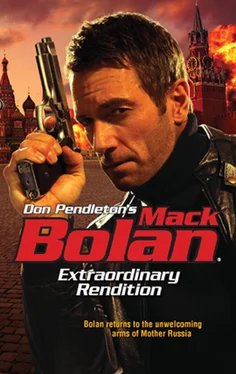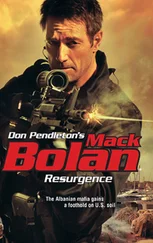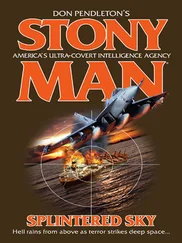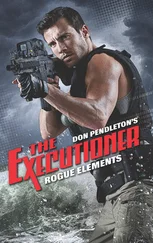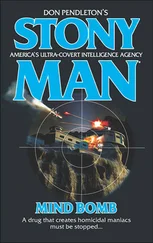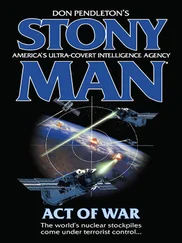1 ...7 8 9 11 12 13 ...16 Off to his right somewhere, he heard Pilkin firing on the run, another pistol answering. Bolan could only fight one battle at a time, and left her to it, with a silent supplication to the Universe.
The shooters he was looking for had made a critical mistake, both emptying their magazines together. It was easy, in the heat of battle, to forget coordination with the troops around you, but there was no “little” error on the firing line. One slip could get you killed.
Like now.
Instead of wasting precious time and energy to run around the front end of the Beemer, Bolan launched himself across its hood, sliding to meet his enemies. He had a flash impression of their faces, gaping at him, then their guns were coming up, ready or not, to meet his charge.
Chaos took over then, with Bolan rapid-firing at the startled faces, blowing them apart at point-blank range where it was strictly personal. The Russians died as Bolan guessed they had to have lived, with brutish violence. They jerked, danced, stumbled, fell together in a twitching heap.
The slide on Bolan’s pistol locked open on an empty chamber. He dropped it, claimed the nearest dead man’s SMG—it was a Bizon, after all—and snugged its unique cylindrical magazine into place.
In front of him, with his back turned, a final shooter blazed away at Pilkin, somewhere beyond the BMW. Bolan shot him in the back without the High Noon drama of asking him to turn around and make it “fair.”
In Bolan’s world, the fair fights were those that he won. No holds barred. There were some lines he wouldn’t cross, but none of them applied to adult predators in battle.
“Clear!” he called to Pilkin, and gave her time to chill before he rose from cover.
She approached him, frowning.
“You got all of them yourself,” she said.
“I wouldn’t claim the driver.”
“What are you, exactly, Mr. Cooper?”
“Just a public servant, like yourself.”
“I don’t think so,” Pilkin replied.
“I think we should be leaving, if your car’s all right.”
“It’s fine.”
“And before we throw any more parties,” he added, “I’ve got some shopping to do.”
Kotlin Island
Gennady Sokolov sipped black-cherry vodka from a crystal glass, letting it linger on his tongue before he swallowed and felt the welcome heat begin to spread throughout his body. He hadn’t decided, yet, if it would be his last drink of the old day or his first of the new one.
That, he reckoned, would depend upon the news from Moscow.
Sokolov wasn’t a patient man by nature. He had learned patience as other men learned carpentry, mechanics or book-keeping—through determination and practice. Much of his time with Spetznaz had been spent waiting or getting ready for some crisis that might never come to pass. Later, when he was serving with the KGB, the typical pace had been slower still. Espionage by committee. Murder by decree, with orders handed down through bureaucratic buffer layers until the deed was executed in New York, Bangkok, Madrid or Rome.
The patience he’d acquired while serving Russia’s government had been of great value to Sokolov once he went private. Those who came to him for weapons always wanted them today—or yesterday, as the Americans were fond of saying—but negotiation of a price and terms for the delivery took time. Oddly, it seemed to Sokolov that those who wished to kill their enemies most urgently were also those who dithered over dimes.
This night he needed patience on his own account, waiting for word that would relieve him of a burden that was tainting every aspect of his life. The Americans were breathing down his neck, determined that he should be extradited in defiance of his homeland’s sacred law.
Whatever happened to their passion for democracy?
So far, they hadn’t laid a glove on Sokolov, though he resented the restrictions on his foreign travel. Documents weren’t a problem, under any name he chose, and Sokolov was self-taught in the art of personal disguise, but covert travel meant that he couldn’t enjoy the luxury to which he had become accustomed.
What, in God’s name, was the point of being filthy rich if he could only flaunt it where he lived?
How was a world-class death merchant supposed to awe new clients when he had to scurry through the shadows wearing a trench coat and an artificial beard?
He’d taught a lesson to the damned Americans when they came sniffing at his dacha, but they hadn’t learned it well enough. Now, sources told him, there was yet another plan afoot to snatch him, this time with collaboration from the FSB.
That hurt.
And when he hurt, Sokolov liked to share the pain.
The latest lesson for his enemies would start in Moscow, where a certain agent from the States was scheduled to arrive that very night. In fact, a stylish wall clock and Sokolov’s Rolex GMT Master II wristwatch agreed that the job should be finished by now. His friends in Moscow should be acquiring the information that Sokolov needed in order to—
He smiled when the telephone rang. Not his cell, but the gold-plated one on his desk, which he rubbed with a chamois after each and every use. Gold smudged with fingerprints was strictly déclassé.
“Hello?”
There was a heartbeat’s silence on the other end, before the gruff, familiar voice replied, “Gennady?”
“Who else would it be?”
“No one, of course,” said Leonid Bezmel, the boss of bosses for the Moscow Mafiya.
“What news?” Sokolov prompted him.
“It’s not good, I’m afraid.”
“Not good.”
“Unfortunately, no.”
“Tell me.”
“These incompetents Taras sent out to the airport missed their man. They’re dead, in fact, which cheats me of the pleasure I’d derive from their chastisement.”
Sokolov drained off his vodka in one swallow and commanded, “Tell me everything.”
CROSSING THE Moscow River on Mokhovaya Street, with the Kremlin complex on their right, Bolan told Pilkin, “We’re not off to the best of starts.”
“I see only three choices,” she replied. “We can give up, press on, or waste time trying to determine which side has the leak.”
“It could be both sides,” Bolan said. “I’ve got someone on my end who can try to run it down, but I won’t guarantee results.”
Pilkin hesitated, then said, “Even asking, with the FSB today, may cause some difficulty.”
Bolan heard that, loud and clear.
“Another way to do it,” he suggested, “is to cut the apron strings and carry out the mission as assigned, before it started going off the rails.”
“The kind of thing that ends careers,” she said.
“Depends on how you finish, I suppose. Or whether you were really meant to do it in the first place.”
“You suspect corruption?”
“Always. I trust the friends I’ve had forever,” Bolan said, “but I can count them on my fingers. And I still look out for number one.”
“I understand this. Here, it is the same. Before the change, we always knew the party leaders placed themselves above the people, but at least they feared exposure and the discipline to follow. Now, when there is so much money to be had, and no one left to draw the line…it’s hard to know the rules, sometimes.”
“When I run into that, I make my own,” Bolan replied.
“We have a handicap,” she said. “You were expected, at the airport. So your name, at least, is known in Moscow. If they also know your face—”
“That isn’t likely,” Bolan interrupted. “And the guys we met tonight aren’t handing out descriptions.”
“You must not use any credit cards, in that case. Or a driver’s license. No cell phone that can be traced.”
Читать дальше
